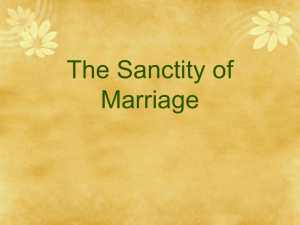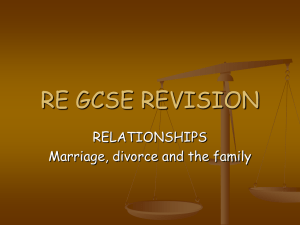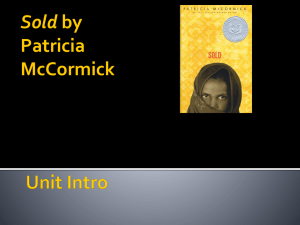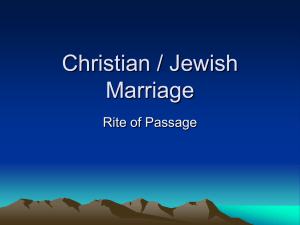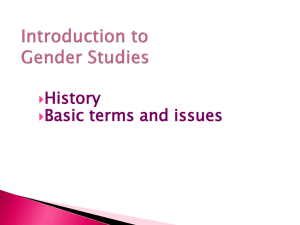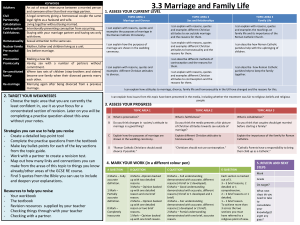November 25, 1945 I greet you all, noble countrymen and
advertisement
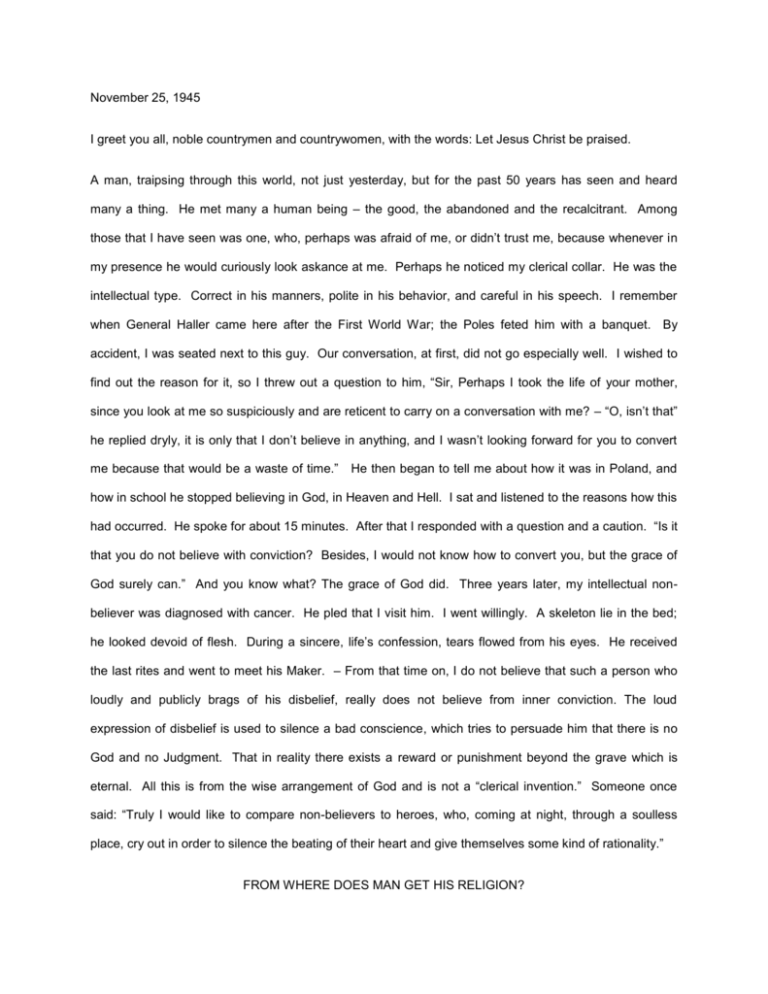
November 25, 1945 I greet you all, noble countrymen and countrywomen, with the words: Let Jesus Christ be praised. A man, traipsing through this world, not just yesterday, but for the past 50 years has seen and heard many a thing. He met many a human being – the good, the abandoned and the recalcitrant. Among those that I have seen was one, who, perhaps was afraid of me, or didn’t trust me, because whenever in my presence he would curiously look askance at me. Perhaps he noticed my clerical collar. He was the intellectual type. Correct in his manners, polite in his behavior, and careful in his speech. I remember when General Haller came here after the First World War; the Poles feted him with a banquet. By accident, I was seated next to this guy. Our conversation, at first, did not go especially well. I wished to find out the reason for it, so I threw out a question to him, “Sir, Perhaps I took the life of your mother, since you look at me so suspiciously and are reticent to carry on a conversation with me? – “O, isn’t that” he replied dryly, it is only that I don’t believe in anything, and I wasn’t looking forward for you to convert me because that would be a waste of time.” He then began to tell me about how it was in Poland, and how in school he stopped believing in God, in Heaven and Hell. I sat and listened to the reasons how this had occurred. He spoke for about 15 minutes. After that I responded with a question and a caution. “Is it that you do not believe with conviction? Besides, I would not know how to convert you, but the grace of God surely can.” And you know what? The grace of God did. Three years later, my intellectual nonbeliever was diagnosed with cancer. He pled that I visit him. I went willingly. A skeleton lie in the bed; he looked devoid of flesh. During a sincere, life’s confession, tears flowed from his eyes. He received the last rites and went to meet his Maker. – From that time on, I do not believe that such a person who loudly and publicly brags of his disbelief, really does not believe from inner conviction. The loud expression of disbelief is used to silence a bad conscience, which tries to persuade him that there is no God and no Judgment. That in reality there exists a reward or punishment beyond the grave which is eternal. All this is from the wise arrangement of God and is not a “clerical invention.” Someone once said: “Truly I would like to compare non-believers to heroes, who, coming at night, through a soulless place, cry out in order to silence the beating of their heart and give themselves some kind of rationality.” FROM WHERE DOES MAN GET HIS RELIGION? What is it that gives man religion? The best and final answer is explained by philosopher Jouffroy: “the Christian Religion reveals the needs and fears of my soul. It answered the question which I found worthy of the questioning of human reason; it is these answers which I could believe in with faith; thanks to this faith I realized with clarity the present life with its changes and death, which unifies; I understood myself; I understood God’s purpose for me and I loved Him for the unfolding of the mystery to my intellect. I was happy with the happiness which derives from a lively and strong faith in the teaching which unfolds all of the guesses of life upon which man thrusts his questions.” Later he let his doubts enter his soul and soon the lights went out and happiness went away; life, which at first was happy became darkness and mortal as the grave; he became like a man who, heading for a chasm, hangs on to uselessness and falls headlong into it. True religion ought to leave its mark on all activities and capacities of man; on his mind, will and heart. The heart of man pines after God. The Catholic Faith demonstrates to the heart that God is not only our Creator and Lord but also a caring Father to whom we always ought to call with hope. “Our Father, who art in Heaven…” Religion enlightens, interprets and warms every moment of life. It does not forbid our needs, or proper joys, but teaches to use them properly and with borders; Religion does not disturb family happiness, does not hinder societal duties, the work of its citizens; it does not forbid a marked concern for material things: “it is a remarkable thing that Christian Religion seems to have not only an eye on happiness in the next life but gives joy to the life on earth. Ask the suffering millions what protects them from despair if not the Catholic Faith? It dries the tears, chills the fever, wipes the sweat of the laboring, gives bread to the hungry, hugs the orphan to its breast, and provides the elderly with a roof over the head. Truly, if there was a lack of religion, the earth would become a grave and life to become an unbearable martyrdom. Just a few weeks ago, I read in one of the English language monthlies an article seemingly by a well-educated professor who demonstrates that despite the fact that life is short and ends in the grave, the obligation of society is to create heaven on earth, so the people may use the things of earth. - This old, weathered walnut shell in a new shell, the pagans used to say: “Use it on earth, because after death there is no pleasure in it.” - A learned and wise professor did not explain to his readership that those who live according to this recipe, must pay dearly for the loss of God, peace for the conscience and eternity. They will never find happiness. Discarded, they will close the book of life in fear and doubt. What does religion do for, or rather what does religion give the family? It is only a few that understand the entire worth and complete meaning of family. And it is enormous. On the individuals forming a family depend the morality of the family, its strength, and the power of a nation. The Catholic family stands guard and watches the family through the sanctification of marriage by establishing laws and obligations of the married persons and through the never-ending vigil in the rearing children. Marriage is not only of human creation or an agreement between a man and a woman by signing a paper. No, marriage is an establishment by God, and from the beginning it is marked by the religious and moral sanctity, unity and indissolubility. If marriage was just a contract, or bought merchandise it would be able to be dissolved on the agreement of the parties or just as the will of one of the parties. Or what’s more the contract would be able to be taken just for a short time rather than for life? Why not just for a few years: or for a few months? Or even for several days? And why just with one party and not more? Why limit human freedom with some kind of darkness of the Middle Ages. Bring in the teaching of “free love” for isn’t man simply a higher form of animal, who ends up in a grave. Happily the Catholic religion guards the moral and sacredness of the family and legislates its protection from bankruptcy and divorce. What rules governed marriage in the yesteryear? Even in current times, where Christianity is unknown or not practiced, the Father and husband is a veritable tyrant, at whose whim, the husband has the power of life or death of the wife and children; the woman is a slave; children are a defenseless sacrifice. In some countries, wives were burned alive with the corpses of their husbands; in others, the husband according to law, could buy himself a wife as well as throw her out of the house, sell her or give her away. In the Greek cultural environment, the state of the family would be so sad that a historian wrote: “If you have no father, and no children you have no marital partner. It is only later that the Christian religion raised the status of the woman and kept her from unjust treatment. It gave women the freedom of choice as regards marriage; it delineated not only the obligations of the wife but her rights as well. It enlarged her sphere of activity and as an example cited the Mother of Christ, the Savior of mankind. The woman occupies a lofty moral and spiritual place in the Christian religion. Through the woman religion has lifted the worth and the dignity of family and society. Considering these factors, brought out by history, I can’t imagine a woman so unappreciative who would scorn religion and at the same time be proud to disbelieve. The Christian religion has definitively the interdependent status of the spouses. Firstly it reminds us with some emphasis that the marital bond is goal-wise the sanctification of the husband, the wife, and the children. That the consistency of married life is not despotic, tyrannical or autocratic on part of the husband but loving, and not such love that will wane as the years go buy because of difficulties but a sincere love, sacrificial, in deed, secure and lasting. It clearly places the woman as a partner and companion worker with rights in respect to her vocation. Someone once wrote: “the husband in the family is the head, the woman the heart – the man governs, the man gives the family life – the man illumines the life of the family, the woman gives it spiritual warmth – the husband provides the daily bread, the wife breaks bread with her children; in order that both may fulfill their responsibilities, keep the peace on their journey to God, buttressed by their religion.” What is happening in current times is done in a spirit which is shrouded in a fog of outlooks and shallow theories of narrow human intelligence. In the first place, it is maintained that marriage. In the first place, it says that marriage is only a hindrance on the independence and spontaneity of men for the most part. Why cramp your style when you can live independently. Secondly the marital tie does not demand faithfulness on either spouse’s side. Thirdly, Love does not enter into the question as far as marriage is concerned; the most important thing is money, which guarantees a comfortable life. Besides, there is always an antidote to marriage and that is divorce. And there is no explanation needed here; the newspapers tell it all. The spirit of time is the unparalleled enemy of children who regard it as a weight upon them and a hindrance of a comfortable and happy life. Thus, arguments of the need of birth control, irrespective of the ways and means. The most children in a marriage: two and then there will be no poverty or the smallest discomfort. I will tend to this idea is the nearest opportunity. Ultimately the irreligious spirit of our times breaks the hearths of homes; houses exist; homes and families disappear. The husband is drawn to clubs, friends of both genders, camaraderie. The home appears to him as cold, foreign sight. The wife, takes hold of life as an entertainment and spends hours in beauty parlors and dresses in fashion, and reads romance novels. She seeks recreation in theaters, concerts, balls and visits. Add to this the laughable imitation of the male and you will not be surprised that the family hearth is empty and abandoned. Let me add a short clarification. The Catholic religion does not condemn reasonable recreation, and does not call for the de-socialization of the woman, or a life of a hermit but at the same time calls for a family life and generally looks for a sacrificial dedication and the execution of family duties of which the bringing up the children in the foremost. It is not only in days of old that the child was a deplorable figure, when the father as the ruler of the house could neglect them, throw them out or sell them. In other countries a law permitted the killing of a retarded of physically impaired child. In other countries, children are taken away from their parents and put into government clinics for experimentation. Did not the Nazis do the same thing from the time that the Germans declared war on religion, and threw out Christian ideas, and brought back pagan practices – the Huns, the Goths, and the Visigoths. - The Christian religion took away the unchallenged authority of the father of the family and control over the life and death of his children and took over the moral authority. It demanded obedience and love of parents by the children. And at the same time gave the parents the duty of rearing the child and giving him material and spiritual support and protection. Religion enlightens the mind, strengthens the will, ennobles the heart; in a word, it builds character, and gives strength to accomplish the work of life and battle, and makes possible to do the tasks of life. Without religion there is not possibility to have good and obedient children and prepare them for a promising future. Otherwise, in our times, looking at all this which is occurring, there is the spirit of hatred for everything which is Godlike and Christ-like. I maintain that children are dissuaded to talk about God, the soul and religion until they grow up. Then, they say, let them come to these decisions when they are older and pick their own religion. What a laughable contradiction. What a naïve piece of non-logic. If the learned themselves maintain, and I use their words that: “it is not a small thing to come to the knowledge that there is a God, and since we came to know that, we ask ourselves what is God; our intellect is confused and hesitates so that we know not how to adjudicate that. So that when the young are left to make their own decision about that matter it is the shortest way to atheism. Remove the religion from educating the young and you leave a pagan generation, barbaric and animalistic. Again, take a look at the German youth who were taught that the greatest criminal in history was Christ and that Christ’s teach was for the weak. I do not dispute that we have wise and caring parents but you should admit that we also have parents whose thought about the rearing their children in religion is about as significant as last winter’s snow. They seemingly worsen their children even they think they are doing them a service in regard to the respect of religion’s importance in the social structure. A certain American soldier wrote to me: “Father, I shall not return after being dismissed from duty, because my father always spoke badly about belief. Other parents permit their children to read literature which attacks religion and Christian morality. Others, give a bad example not only by neglecting the teachings of the Church and take weekly worship as of no real worth. By saying that they are too busy or that the weather is too bad to teach them that worship at Mass is nothing significant. It is very important for everyone to recognize that family life is built upon Christian religion. The man who has faith, because he was brought up in Christian virtue is steadfast. A nation built upon these principles can weather all storms and is capable of taking hurts, for it has a healthy spirit. Man is by nature a religious being as well as a social being, since he has to live among and with others who are part of the social structure and ruled by governments. If religion is needed and beneficial for the family which is composed of individuals, it is also needed and beneficial for nations and governments who are made up of families. That nations cannot survive in social structure is generally accepted by governments in general. That is why they strove to have their citizens show honor to God. Beginning with Moses and ending with thinkers of every age. “Seek a people without religion; if you can find them, and you will be sure that it resembles animalistic ways.” The father of our nation wrote that “religion and morality are the foundation on which our country must rely.” Religion holds a true freedom, heartfelt brotherhood and a just equality. It does not battle with the great and the rich, it does not destroy the difference in the states and does not take away the rights of the wealthy and the powerful but reminds all of the words of the Savior and Teacher: “whoever is the greater among you should be your servant.” - He reminds those who rule that they have the power to rule according the God’s law, and to be fathers and not tyrants of the people. “Religion is a minor thing to those who hold human law as minor and think that they are above the law. “The monarch who hates religion, but also fearful of it, is an animal chained, which therefore cannot hurt. If, however, he rejects religion, he becomes a bloodthirsty monster, not having any other aim in destruction, than his own liking. The evidence points to the 34 German leaders, who await sentencing in Nuremburg. Religion reminds those under authority that you need to give to Caesar what is Caesar’s and to God what is God’s. Religion is indispensable in every nation because it is the guardian of morals. It is a veritable fortress for every country, a stronghold of public morality, which is not properly the state’s, and cannot be effectively replaced. Neither the police, nor courts have to access to conscience; only religion can look into it and dictate. Religion has the prescription to tame evil in its source. It sows the seeds of obedience for authority, and creates the capability to create laws. It creates respect for private property and urges to the fulfillment of civic duty. Even the French rationalist, Voltaire, wrote: “To destroy religion means effectively to fill the earth with criminals and thieves.” Napoleon I proclaimed, “No society can exist without morality, one cannot have true morality without religion. Only religion can serve as the underpinning of society. Society without religion is a ship without a compass.” For years, many years, the leaders of mankind, oblivious to the truth, proclaimed the ideal of the twentieth century: a state without God, without God's law, a school without God, family life without God. The effects of this science: today our eyes look at this ideal with fear, disgust and anger. This effect of destruction and upheaval would present itself before the eyes of the world for the next 25 years. Can this outlook keep humanity in a society surviving in peace without the commandments of God? I doubt it, because people forget and wish to be hoodwinked. Religion is the birth mother of a healthy civilization and true advancement. History bears this out. Religion stands as guard of continual peace. It continually condemned the bloody Teutonic banner “Power over Law! Religion, unable to turn political and diplomatic forces, continues to call for peace and continues to ask respect of civil law, and tries to keep the spirit of Christianity as a force for the world. Nations have faced crises and continue to do so since people left the dictates of morality. They listened to the tempting and subversive voices of rebellion with the help of the written journalism. We believe and live under God, and then and only then we can peacefully look forward to the future.
